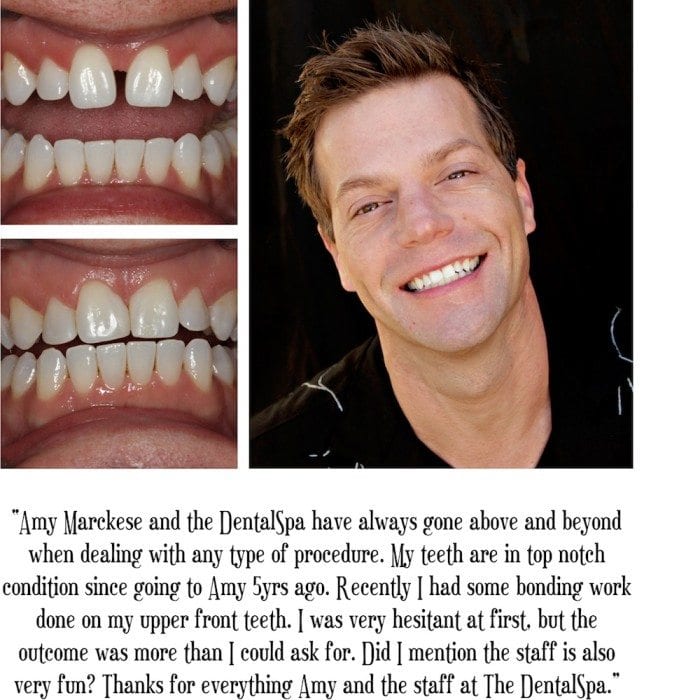If you are looking to improve your smile, Dr. Amy Marckese offers cosmetic tooth bonding near you for many cosmetic dental issues. Tooth bonding is a quick and easy cosmetic dentistry treatment for patients with minor cosmetic and functional issues. The experts at DentalSpa can complete the cosmetic teeth bonding procedures in a single office visit.
Learn More About Cosmetic Tooth Bonding
Tooth bonding uses a tooth-colored, biocompatible composite resin to hide flaws in teeth. The dentist applies the resin directly to the tooth, sculpts it into the proper shape and form, and then cures it using a special light. We can also combine dental bonding with other cosmetic dentistry procedures as part of a smile design.
Composite dental bonding commonly treats:
- Chipped or cracked teeth
- Gaps between front teeth or any teeth
- Discolored tooth structure
- Fill dental cavities
- Misshapen teeth
- Short, stubby teeth to make teeth appear longer
Dr. Marckese uses composite dental bonding as a conservative treatment for patients. The process is very similar to a resin dental filling. Composite bonding does not remove the tooth’s natural structure, as in porcelain veneers or dental crowns.

While dental composites are extremely durable, they are not permanent and may need to be retouched or replaced. Porcelain restorations, such as dental crowns or veneers, are permanent and much longer-lasting. Dental composites may also be more susceptible to staining from foods and beverages, so special care should be taken to ensure long-term success.
About Our Cosmetic Tooth Bonding Procedure
Cosmetic teeth bonding is typically completed in less than an hour during a single visit to our Indianapolis dentist office. Dr. Marckese will select a composite resin color that closely matches the color of your natural teeth for virtually unnoticeable treatment.
Our dentist in Indianapolis, IN will prepare the tooth’s surface (or teeth) to be treated. She will directly apply a tooth-colored, biocompatible composite resin and sculpt it into the desired shape. An ultraviolet light or laser hardens the tooth-colored resin material.
Once the composite has cured, Dr. Marckese will trim, shape, and polish it to match the sheen of the rest of the tooth surface. Teeth bonding requires the precision and artistic ability of a skilled cosmetic dentist like Dr. Marckese since the work is done freehand without molds or impressions.
Cost of Tooth Bonding
Tooth bonding is often covered by dental insurance when used to address tooth damage or dental health concerns, but it is also an alternative to the more expensive option of dental veneers. Before your treatment, we will discuss all aspects of your tooth bonding procedure, including cost. We accept all dental insurance plans and work with patients to estimate their portion of the total cost.
What are the Advantages of Teeth Bonding?
Tooth bonding is a simple and versatile dental treatment that offers many benefits. This cosmetic dentistry treatment is a quick and easy way to repair minor chips, cracks, or gaps in your teeth. Dr. Marckese can typically complete the teeth bonding process in just one dental office visit, saving you time and hassle.
Also, dental bonding is a rather affordable treatment option compared to other cosmetic dental procedures. The material we use in the bonding process is easy to work with. Dr. Marckese can shape it by hand into the proper shape and make the color to match the rest of your teeth. These benefits will ensure you get natural-looking results.
Finally, teeth bonding is a non-invasive process that doesn’t require the removal of a lot of tooth structure. Dr. Marckese can fix your teeth while preserving more of it. This dental treatment is a great choice for people who want a simple and effective way to improve their smile.
The Limitations of Dental Bonding
Teeth bonding has its limitations and might not be a suitable treatment for every dental issue. While it’s a quick and easy fix for minor chips, cracks, or discoloration, it’s not as strong or long-lasting as other dental procedures. Bonding material can chip or wear down over time. This is more likely to happen if you have a habit of grinding your teeth or if you often eat hard or sticky foods.
We also do not suggest it for large areas of damage or for teeth that need a lot of structural support. In these cases, we will suggest using porcelain veneers or dental crowns to repair your teeth. These treatments offer better long-term results. At your consultation, Dr. Marckese will assess the tooth and give you your best treatment option. If you require a small, minor repair, she will likely suggest dental bonding.
Tooth Bonding: Frequently Asked Questions
Not many patients realize that tooth bonding is an option for fixing cosmetic imperfections on their teeth. If you have minor dental chips, cracks, or gaps, we encourage you to consider tooth bonding. Start by reading common questions asked by our other patients about cosmetic bonding. If you have further questions, please contact us.
How long does cosmetic bonding last?
The lifespan of your bonding can vary, depending on your regular dental cleaning habits. On average, the bonding material lasts three to ten years before it needs replacement.
Does bonding ruin your teeth?
There are no major risks with dental bonding. The composite resin used with dental bonding isn’t as strong as your natural teeth, so it is possible for the bonding material to chip or separate from the bonded tooth. This is uncommon and occurs less than with crowns, veneers, or fillings.
Can you whiten bonded teeth?
You don’t need to whiten the composite resin used in dental bonding like your natural teeth. You can still get teeth whitening on the bonded tooth; however, the composite resin will not whiten.
Does dental bonding look natural?
We color your dental bonding’s composite resin to match the shade of the surrounding teeth to maintain a natural look. If used for whitening, the bonding can be adjusted to match the shade of the surrounding teeth to keep your smile looking natural and healthy.
Does drinking coffee with bonds on teeth cause staining?
Dental bonds can stain, just like natural teeth. Regular coffee drinkers may find that their dental bonds become stained over time. The more deeply-colored beverages a patient drinks, the more likely they will have stained bonds.
Can you eat normally with composite bonding?
After we place composite bonding on your teeth, it takes 24 hours to fully harden and settle. To avoid irritation, stick to a soft diet during this period. Once your bond has healed, you may return to your regular diet.
How do you take care of cosmetic bonding?
Patients with cosmetic bonds should practice a regimented oral care routine. Brushing and scheduling regular cleanings are important to keep the bond in good condition for as long as possible. Patients should also avoid smoking because it may stain the bond.
How long does dental bonding take?
The duration of your tooth bonding treatment depends on the complexity of the case and the number of teeth. It takes Dr. Markese about 30 to 60 minutes to bond a single tooth. Compared to other cosmetic dental treatments, it’s relatively quick and straightforward. However, the time varies based on the extent of the bonding required and the specific condition of the teeth being treated.
Will people be able to see my bonded teeth?
Tooth bonding matches your teeth’s natural color and shape, making them virtually indistinguishable from others. Dr. Markese will blend the bonded material seamlessly with your natural teeth, ensuring a natural appearance. With proper care, bonded teeth can look and function like natural teeth, leaving others unaware of the treatment.
Schedule a Dental Exam for Cosmetic Tooth Bonding in Indianapolis, IN
If you want to learn more about how composite dental bonding could address your dental concerns, contact our dentist in Indianapolis, IN. Call us at 866-486-0230 or schedule an appointment online. We look forward to meeting your needs and goals for your smile and helping you enjoy the lifelong benefits of good oral health.
